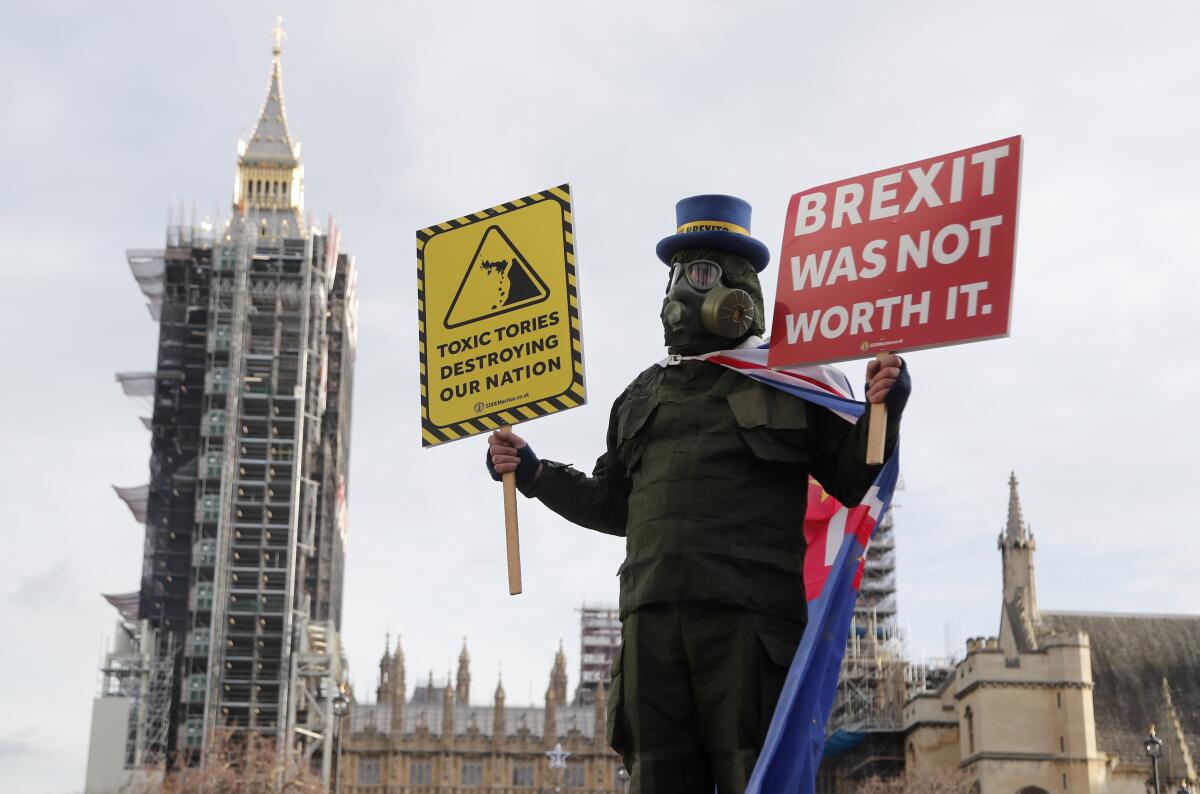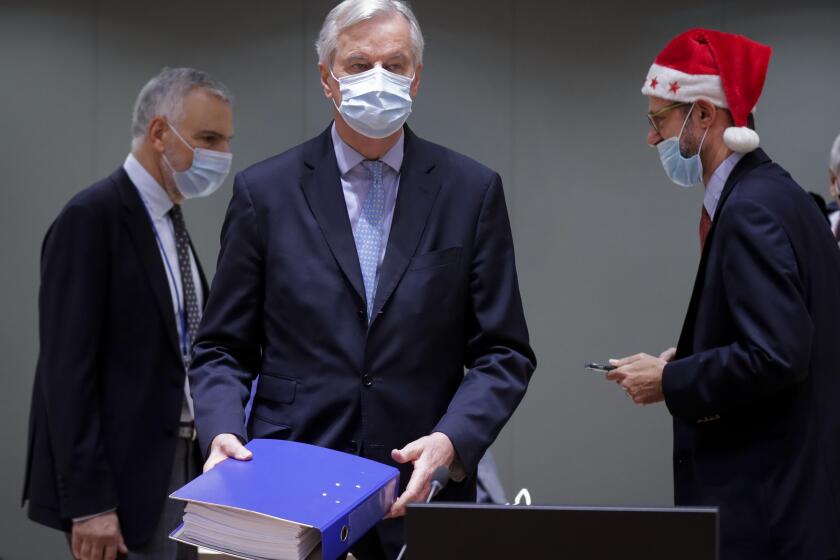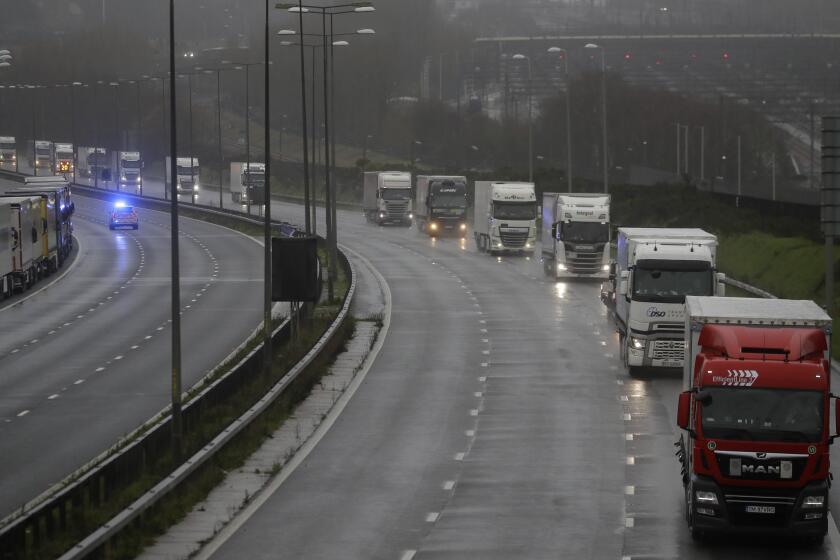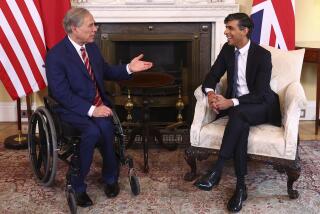British Parliament approves post-Brexit trade deal with EU

- Share via
LONDON — Britain’s House of Commons voted resoundingly Wednesday to approve a trade deal with the European Union, paving the way for an orderly break with the bloc that will finally complete the U.K.’s years-long Brexit journey.
With just a day to spare, lawmakers voted 521 to 73 in favor of the agreement sealed between British and European negotiators last week.
The deal became British law once it passed through the unelected House of Lords late Wednesday and then received a rubber-stamp royal assent from Queen Elizabeth II.
Britain formally left the EU almost a year ago but remained within the bloc’s economic embrace during a transition period that ends at 11 p.m. Thursday in Britain, which is midnight in Brussels.
European Commission President Ursula von der Leyen and European Council President Charles Michel signed the agreement during a brief ceremony in Brussels on Wednesday morning. The documents were then flown by Royal Air Force plane to London, where British Prime Minister Boris Johnson added his signature.
“The agreement that we signed today is the result of months of intense negotiations in which the European Union has displayed an unprecedented level of unity,” Michel said. “It is a fair and balanced agreement that fully protects the fundamental interests of the European Union and creates stability and predictability for citizens and companies.”
The post-Brexit trade deal between the U.K. and the EU wards off a chaotic rupture, but British officials warn of a bumpy ride ahead.
The European Parliament also must sign off on the agreement but is not expected to do so for several weeks. The agreement will be enacted provisionally until then.
Just after the EU’s top officials formally signed the hard-won agreement in Brussels, Johnson urged members of Parliament to back a deal that he said heralded “a new relationship between Britain and the EU as sovereign equals.”
It has been four and a half years since Britain voted by a slim margin, 52% to 48%, to leave the bloc it joined in 1973. The official divorce was declared Jan. 31, but the actual repercussions of the split have not been felt because of the transition period.
That is now set to change. The trade deal, hammered out in more than nine months of tense negotiations and sealed on Christmas Eve, will ensure that Britain and the 27-nation EU can continue to trade in goods without tariffs or quotas. That should help protect the $894 billion in annual trade between the two sides, and the hundreds of thousands of jobs that rely on it.
Brexiteers staked the country’s future on Boris Johnson, believing he could lead an exit from the European Union with benefits and no costs. It’s not turning out that way.
But the end to Britain’s membership in the EU’s vast single market and customs union will still bring inconvenience and new expense for both individuals and businesses — from the need for tourists to have travel insurance to the millions of new customs declarations that firms will have to fill out.
Brexit supporters, including Johnson, say any short-term pain will be worth it.
Johnson said the Brexit deal would turn Britain from “a half-hearted, sometimes obstructive member of the EU” into “a friendly neighbor — the best friend and ally the EU could have.”
He said Britain would now “trade and cooperate with our European neighbors on the closest terms of friendship and goodwill, whilst retaining sovereign control of our laws and our national destiny.”
Britain becomes the first country to greenlight AstraZeneca’s COVID-19 vaccine, a shot that is easier to store and handle than some rival vaccines.
Some lawmakers grumbled about being given only five hours in Parliament to scrutinize a 1,200-page deal that will bring profound changes to Britain’s economy and society. But its passage in the House of Commons was not in doubt because of Johnson’s large Conservative majority.
The Conservative Party’s powerful “Euroskeptic” wing, which fought for years for the seemingly long-shot goal of taking Britain out of the EU, backed the deal.
The strongly pro-EU Scottish National Party and Liberal Democrats voted against the agreement. But the main opposition Labor Party, which had sought a closer relationship with the bloc, said it would vote for the agreement because even a thin deal was better than a chaotic no-deal rupture.
“We have only one day before the end of the transition period, and it’s the only deal that we have,” Labor leader Keir Starmer said. “It’s a basis to build on in the years to come.”
Breaking News
Get breaking news, investigations, analysis and more signature journalism from the Los Angeles Times in your inbox.
You may occasionally receive promotional content from the Los Angeles Times.
Former Prime Minister Theresa May, who resigned in 2019 after three years of Brexit acrimony in Parliament, said she would vote for Johnson’s agreement. But she said it was worse than the one she had negotiated with the bloc, which lawmakers repeatedly rejected.
She noted that the deal protected trade in goods but did not cover services, which account for 80% of Britain’s economy.
“We have a deal in trade, which benefits the EU, but not a deal in services, which would have benefited the U.K.,” May said.
More to Read
Sign up for Essential California
The most important California stories and recommendations in your inbox every morning.
You may occasionally receive promotional content from the Los Angeles Times.













